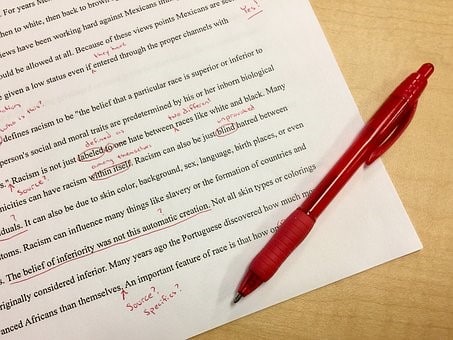10 Reasons to Hire a Professional Nonfiction Editor
April 15, 2022
“The life of an editor is not a glamorous one. You’re a fixer; you make things better.”—Courtney B. Vance
The work of an editor often goes seemingly unnoticed. When readers work their way through a book, they fail to realize an editor’s vital role in making that book outstanding. While writers get most of the accolades, editors sit in the background, doling out their indispensable labor.
In this article, we will explore 10 key ways a professional editor can improve the overall quality of any nonfiction text.
10 Key Reasons to Hire a Professional Nonfiction Editor
1. Professional editors have fresh eyes.
American author Thomas Wentworth Higginson once said, “Originality is simply a pair of fresh eyes.” Indeed, an editor can provide a valuable pair of fresh eyes. Writers often travel in circles attempting to improve a manuscript.

However, there comes the point where a fresh pair of eyes can spot issues writers cannot detect.
As a result, hiring a professional editor ensures that nothing falls through the cracks.
They can provide insight into even the most minuscule of elements.
Ultimately, a professional editor ensures originality by offering a third-party perspective.
It is worth noting that a fresh pair of eyes can spot a writer’s unconscious mistakes.
For instance, it is quite easy for nonfiction writers to allow their personal opinions to skew their representation of the facts. A professional editor can help ensure a writer maintains an objective view of the information as they build a clear and consistent argument.
2. Professional editors provide objectivity.
Objectivity is the perfect complement to a fresh pair of eyes.
As writers go through their manuscripts, they tend to get caught up in their particular voices. After all, writing a book is like raising a child. There is a significant emotional attachment between a writer and their work. Consequently, it might be challenging for a writer to spot areas for improvement.
That is where a professional editor can make a significant difference.
A professional editor can provide objective insight into a working manuscript. Most important, professional editors play a crucial role in nonfiction works.
Their objective viewpoint can help identify factual mistakes and unproven claims and provide support to the text’s overall argument.
3. Professional editors help save time and effort.
Writing requires dedication and commitment. Any good piece of writing demands a concerted effort in order to craft good-quality text.
However, the editing process can become time-consuming and laborious for writers, especially after spending a considerable amount of time and effort producing a working manuscript.
Indeed, automated tools can drastically reduce the time needed to proofread a manuscript.

However, hiring a professional editor is necessary to ensure the text’s quality.
While writers can go through their own work, it may require additional time and effort. A professional editor’s expertise enables them to review a working manuscript in the fraction of the time it would take writers themselves.
Professional editors ultimately play a crucial role in ensuring a book is up to publishing standards.
It is worth mentioning that foregoing the intervention of a professional editor can lead to mediocre results.
Sadly, this reality permeates the self-publishing domain. Aspiring writers view self-publishing as a means of cutting corners. Consequently, they bypass the editorial process in hopes of accelerating the publication of their book.
This approach, however, leaves the door open to a host of mistakes, sub-par materials, and even inaccurate information. These potential shortcomings underscore the main reasons why self-published nonfiction texts do not get the same degree of attention that traditionally published materials receive.
4. Professional editors keep the writing process moving.
All writers go through some form of “block” or “get stuck” during the writing process. Nonfiction writers may find it difficult to build their book’s argument or have trouble articulating their thoughts. In such cases, a professional editor can take a deep look into a working manuscript.
A solid editorial assessment can often remove roadblocks, thus allowing the writer to continue developing the text.
Professional nonfiction editors are experts in helping writers unpack their thoughts. As a result, a professional nonfiction editor aids writers in keeping the writing process moving, thereby saving substantial amounts of time and frustration.
5. A professional editor is a professional.
By definition, a professional editor is a professional. They have the experience and training needed to take diamonds in the rough and polish them into magnificent pieces.
As American novelist Karen Thompson Walker once stated, “Working as an editor was like being a professional reader, and the better I became at reading, the better I became at writing.”

Professional nonfiction editors are undoubtedly professional readers. They are are often professional writers, as well.
Consequently, they have a keen sense of what works and what does not.
While it helps to have friends, colleagues, and family read through working manuscripts, the feedback a professional editor can provide is unparalleled.
6. A professional editor is human.
Nowadays, automated editing tools receive a great deal of attention. Automated tools can indeed help reduce the time needed to proofread documents.
But no machine, however well-designed, can replace the human brain. That is why professional nonfiction editors are very much in demand today.
Artificial intelligence cannot replace the understanding, feeling, and voice that the human mind can bring to writing. Perhaps, at some point in the future, automated tools may be able to replace humans. In the meantime, there is no substitute for the valuable input a professional nonfiction editor can deliver.
Best-selling novelist Stephen King once remarked, “To write is human, to edit is divine.”
There is no doubt that professional editors endeavor to take writing to a sublime level. A professional editor can help writers unlock their most profound thoughts and feelings. That is something no machine could ever achieve.
7. A professional editor is a multifaceted expert.
Most folks typically view professional editors as proofreaders.
Naturally, editorial duties do include proofreading for linguistic issues.
However, reducing professional editing to merely proofreading is unfair.
The truth is, professional editors are generally multifaceted experts. And professional nonfiction editing requires individuals to possess a number of skills.

To begin with, professional nonfiction editors must have an expert-level understanding of the English language (or any other language they edit) in addition to a substantial knowledge of the text’s subject. After all, one cannot expect a professional editor to adequately review a text if they have no idea what it means.
Additionally, professional editors must play a dual role. They must understand both writers and readers.
First, professional nonfiction editors need to comprehend the writer’s voice and message. Second, a professional editor must also understand what the reader seeks to gain from the text. The challenge, then, becomes to mesh both positions into a coherent discussion that properly negotiates meaning among all parties.
The best part is that professional editors make such tasks look easy.
8. A professional editor improves the overall product.
American actor Sam Rockwell once said, “An editor is like a painter. There is a magic in that.” This profound statement encapsulates two key elements.
First, editors must handle a work of art with the utmost care. The thought of editors ruthlessly hacking through manuscripts is short-sighted and disrespectful.
A professional editor ensures that the text in their possession receives the care and attention it deserves. It is quite common for editors to view a text like a delicate flower in need of nurturing. The text can blossom in the reader’s eyes with the right touch.
Second, editors work their magic in a myriad of ways. Professional editors must sometimes have mind-reading skills. They must transport themselves into the minds of the readers. In doing so, nonfiction editors can translate the information into a text that resonates with readers.
Even when information is perfectly accurate and arguments well-structured, professional editors can bridge the gap between the author and reader. Metaphorically, editors can take the Mona Lisa and somehow make it better. This seemingly magical ability is the result of knowledge and experience.
9. A professional editor is flexible.
A common misconception surrounding editors describes them as judgmental and intransigent. The thought of an all-knowing editor makes some writers shudder. Some writers feel wary of editors out of fear that an editor might slice their work into pieces.
This idea is nothing more than an unfounded myth.

Professional editors are flexible people who are willing to listen.
A reputable nonfiction editor takes the time to sit down with writers. They go over the writer’s ideas to gain insight into the vision impregnated in the text.
Without this understanding, a nonfiction editor’s job would become extremely complex.
Professional editors often develop close relationships with writers. As the relationships become closer, a writer and editor can develop an intuitive understanding of each other’s individual styles.
A professional editor knows they do not have all the answers.
They are aware that producing a high-quality text requires mindful interaction.
The best editors know they must be sensitive to a writer’s thoughts and feelings. Ultimately, a writer’s thoughts and feelings should leap out of every page. A professional editor is the subject matter expert that can help clear obstacles along the way.
10 A professional editor is a coach.
Professional editors often work with inexperienced writers. Many novice writers have raw talent. However, these writers find it challenging to articulate their ideas into a seamless narrative. This situation is especially true in the nonfiction domain.
Nonfiction writers often have a wealth of knowledge in their area of expertise. Nevertheless, they lack the skills and experience to articulate that expertise into a fruitful reading experience. In these circumstances, professional editors become coaches. They help writers find their unique voice and style.
In some instances, professional editors may sit down with a writer to go over areas for improvement. In other cases, editors can help writers through a developmental edit. This type of edit allows writers to see how far they have taken their manuscript and where they could go with it.
It is worth noting that professional editors do not have all the right answers. Professional editors have insight that comes from experience. Like sports coaches, editors know what it takes to become a champion. Thus, professional editors aim to turn writers into champions in their own right.
What A Professional Editor Is Not
Professional nonfiction editors are many things. They wear many hats, often simultaneously. They play a number of key roles throughout the writing process. They may even become mentors for some writers. However, it is important to highlight what professional editors are not.
First, a professional editor is not the “boss.” Even when an editor-in-chief has a functional leadership position, they do not see themselves as the “boss.”
Even when an editor-in-chief has a functional leadership position, they do not see themselves as the boss.
Instead, a professional nonfiction editor sees themselves as the captain of a ship. Therefore, a professional editor must coordinate the efforts needed to ensure the ship gets safely to harbor.

Second, a professional editor is not a “fan.” While it may be true that editors enjoy reading manuscripts, they must maintain an objective mindset.
Fans generally have biased opinions. They judge texts based on their individual perception. Consequently, they may fall prey to confirmation bias.
A professional editor must, therefore, maintain a level head. They must ensure that information is factual and the narrative is coherent, even if they do not necessarily agree with the author’s position.
Lastly, a professional editor is not a “gatekeeper.” This idea is a misrepresentation of an editor’s job.
Unfortunately, some writers believe they must get past their editor in order for their manuscript to reach publication. The reason editors review texts is to ensure that the text is up to professional standards. Sub-standard texts generally fall by the wayside, defeated by criticism. A professional nonfiction editor can help authors construct their text so they can withstand the test of time.
































Thank you for your article about hiring a professional non-fiction editor. The point about not being a fan is true. We are supportive, but not the flag wavers. Unfortunately, the word edit has a negative connotation. I prefer to think of the process as enhancing the author’s work.